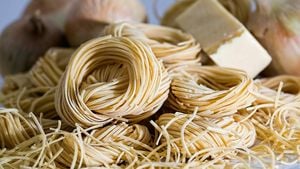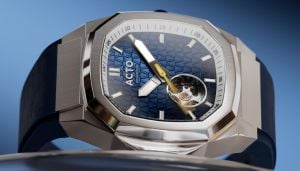Dubai Chocolate has become the center of intense debate among consumers and companies alike, generating buzz and mixed sentiments among choco lovers everywhere.
At the heart of this issue is the question of whether "Dubai Chocolate" describes a unique product originating from Dubai or merely serves as a generic term for chocolate with pistachio filling. Major retailers Aldi and Lidl are now being drawn potentially to legal battles surrounding this deliciously controversial chocolate.
This cocoa delight, filled with rich pistachio cream, has skyrocketed to fame, blending luxury with accessibility as it appears on the shelves of discount stores at remarkably low prices. Yet, this rapid rise has prompted scrutiny from Wilmers, the sweets distributor from Brandenburg, which holds exclusive European distribution rights for "FEX Dubai Chocolate." According to Lebensmittel Zeitung, Wilmers has sent legal notices to Aldi, Lidl, and even Lindt, asserting claims of misleading advertisement."
"The designation 'Dubai Chocolate' is misleading and accordingly impermissible," said Wilmers, emphasizing the point of origin for such delicacies. The distributor argues the chocolate sold by these retailers does not come from Dubai, thereby diluting its authenticity and misleading consumers.
On the contrary, the Bundesverband der Deutschen Süßwarenindustrie (BDSI), the body representing candy manufacturers, argues otherwise. They claim "Dubai Chocolate" should be treated as a generic offering similar to terms like "Wiener Würstchen" or "Pils." Carsten Bernoth, the BDSI head, explains, "The name refers to a geographically confined area (Dubai), but consumers connect it to information about the product’s quality."
This debate has ignited interest and fueled sales, propelling the demand for such sweet treats at discount retailers. Popularity has dramatically surged, leading to shortages as customers flock to snag the affordable versions. Indeed, reports indicate the demand at Aldi and Lidl surpasses supply limits significantly.
Meanwhile, we see changes already happening on the shelves. Lindt has rebranded its "Lindt Dubai Chocolade" to "Dubai Style Chocolade"; meanwhile, Lidl has turned its offerings of "Deluxe Dubai Chocolate" to limited editions. The moves hint at efforts to navigate alleged legal pitfalls and clearly distinguish themselves from the traditional Dubai chocolate product.
Will Aldi follow suit? The retailer still has time to respond to Wilmers' legal notices. The possibility remains, though, the matter could escalate to court proceeding, potentially leading to some abrupt changes for chocolate lovers.
Wilmers insists the legal framework supports their claim; they demand both Lindt and Aldi's feedback by December 17, 2024. If nothing changes, the sweet hype over this commodity could, quite ironically, turn sour.
The dynamics at play here encapsulate the broader market forces surrounding food branding and pricing. Chocolate, particularly varieties associated with luxury, commands hefty price tags. While authentic Dubai chocolate can sell for as much as €20 per 100 grams, many are left questioning whether the price aligns honestly with the product's ingredients.
Interestingly, studies show the actual costs of manufacturing such chocolate are significantly lower, around €10 from purchasing raw ingredients directly. Even if one makes it at home with quality ingredients, the expenses could dip to €6 at most. So why does Dubai Chocolate retain such premium prices?
Luxury and exclusivity play huge roles here, bolstered by the fervent marketing narratives driving up both appeal and cost. It seems the scarcity and widespread media attention has cemented Dubai chocolates as not just sweet treats but status symbols driven by consumer demand.
Nutritionists like Uwe Knop view the chocolates with skepticism. They declare no evidence reveals superior dietary benefits over other chocolates. They argue the average consumer isn’t getting anything beyond what exists across other options on the shelf—be it dark, milk, or artisanal treats. He is quick to suggest healthier homemade alternatives leveraging fresh ingredients instead.
What repercussions could this confrontation yield? Lindt’s rebranding efforts suggest the company knows its products are walking the fine line of legal compliance. Meanwhile, Aldi and Lidl will be watching closely as this sweet legal saga develops, hoping it resolves favorably so they can keep the delightful treats rolling on their shelves without interruption.
All eyes will now be on the chocolate aisle as consumers await not only the verdict following legal measures but also what becomes of the marketing behemoth surrounding Dubai Chocolate. Will it endure as the luxury item we all dream of, or will this hype taper off, relegated to seasonal candy shelves at discounted prices?



